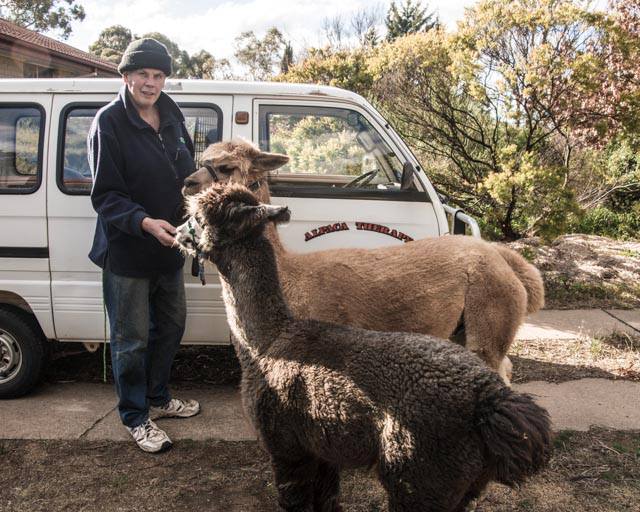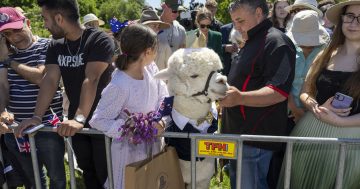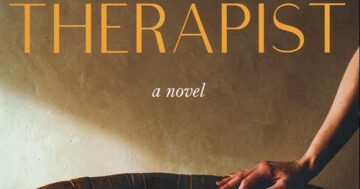
Nils Lantzke with two of his trained therapy alpacas. Photo: File.
There’s sad news about some of Canberra’s most dedicated carers: Nils Lantzke has decided it’s time to retire his therapy alpacas after almost two decades bringing the gentle, nurturing animals together with people who are dying, seriously ill or struggling with severe mental health issues.
Many Canberrans will fondly remember seeing his first alpaca, Honeycomb, travelling around town in the back of Nils’ red hatchback. More recently, he was overwhelmed by the public’s generosity after his alpacas Mimosa and Hercules were savaged by an unleashed dog while walking on the bike path adjacent to Baldwin Drive in Giralang in 2019.
Inexplicably, the owner filmed the attack rather than intervening. To date, nobody has been charged although Mimosa’s injuries were devastating and she had to be put down as a consequence. But a community effort spearheaded by hit104.7 brought Paprika into his life.
Nils says a mix of factors has influenced his decision to call it a day on the therapy program.
COVID-19 restrictions prevented him from taking the alpacas into many of the places where they’ve worked in the past, feed has become more difficult to access and, more than anything, he is just tired.
“To be honest, I’ve had 17 years without a break aside from an injury, but even then, we were still meeting people,” he tells Region Media. “I’m feeling a bit tired and not in great shape as time marches on. The spirit is willing but the flesh is weak.”
The animal therapy idea took root in 1994 when Nils was volunteering as a massage therapist at the Canberra Hospital, working with people who were dying.
“There was a patient who had a brain tumour and had gone blind but loved animals. I borrowed a baby rabbit from a pet shop and took it in so she could touch it. I just laid it on her chest.
“The look on her face was magical and I knew I was onto something special.”
Nils acquired his first alpaca, Honeycomb, in October 2003. Honeycomb’s mother had died in a paddock at Captains Flat, but Honeycomb miraculously survived, coming to live with Nils in suburban Canberra. Nils walked the tiny alpaca around the streets and was approached by a woman he knew whose elderly father had not spoken in years.
“She asked if I could take Honeycomb to meet him. I took the old gentleman’s hand and put it on Honeycomb’s woolly little head. Then the old man repeated Honeycomb’s name, very slowly – and started speaking again.
“All I ever wanted was to create smiles, and that’s what we’ve been able to do.”
Nils says that taking the alpacas into Clare Holland House, the Adult Mental Health Unit and hospitals has never been a problem. Managers and clinicians saw the value immediately and Nils’ work has inspired others too. People in the United States and Norway have been in touch to say that they’re taking their animals into nursing homes.
Nils is proud of that.
“It’s nice to think that my alpacas have sparked interest in other people,” he says. “It’s all about spreading love.”
The alpacas are highly sensitive animals and seem to have a particular awareness that the end of life is approaching or that patients are particularly vulnerable, including those struggling with cancer, motor neurone disease and severe mental health issues.
“Alpacas and llamas are instinctively among the most protective animals on earth, and I saw that again and again. I remember Honeycomb lying at the bedside of a patient who was very close to death, instinctively offering him protection and Hercules at the bedside of a tiny little boy who was dying, standing in the alert position to take care of him,” Nils says.
“Willow is incredibly sensitive, and she always knew when someone was hurting, even if they hadn’t let people around them know.”
These days, the alpacas reside at Wallaroo and Nils travels out frequently to feed his friends their favourite treats – carrots, dates and sultanas.
He’s not sure what comes next for him and the flock of friends who have brought so much joy to so many at difficult times in their lives. But knowing how much pleasure he has brought to those facing immense challenges has been a privilege and an honour, he says.














